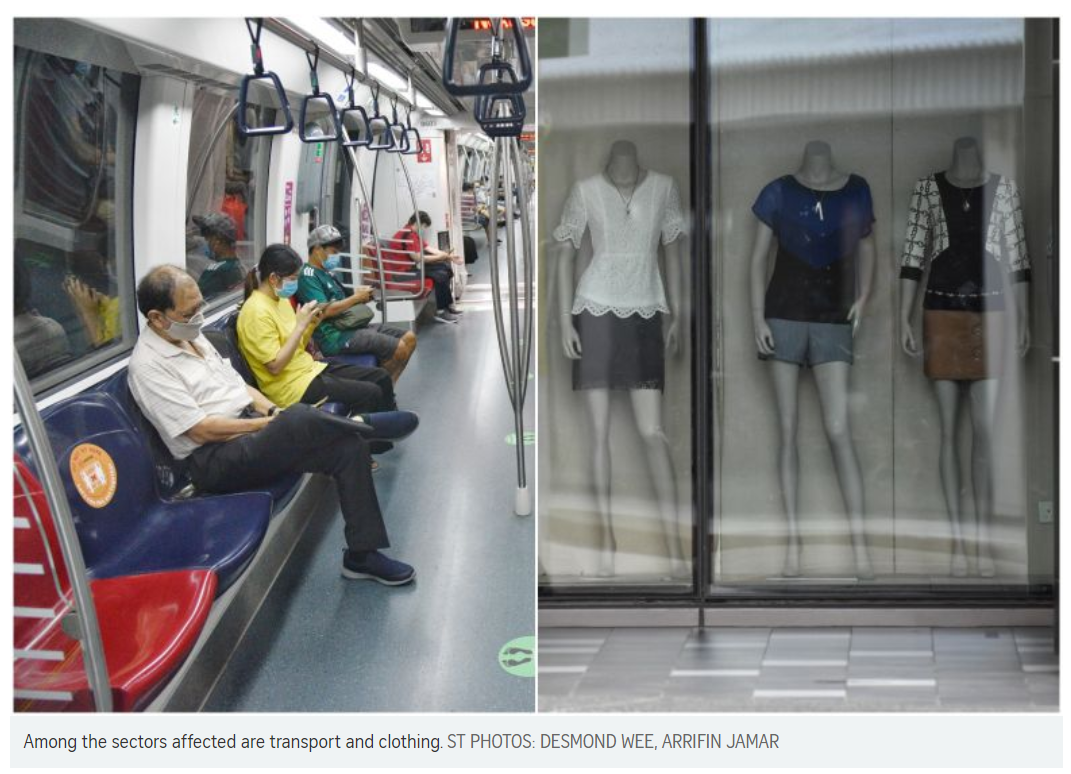Singapore: 60% of consumer spending hit by coronavirus circuit breaker measures: MAS
SINGAPORE – About 60 per cent of consumer spending in Singapore has been hit by circuit breaker measures to tackle the Covid-19 outbreak.
Among the sectors affected are transport, clothing and footwear, as well as recreation and culture, the Monetary Authority of Singapore (MAS) said in its twice-yearly macroeconomic review on Tuesday (April 28).
But spending on healthcare services and products, alcoholic drinks and tobacco products, and housing and utilities have not been affected, it said.
Visits to restaurants, malls and other recreational places have also declined by about 60 per cent as of April 17, compared with the first five weeks of 2020, based on data from Google location notification services, MAS noted.
Consumer-facing services, such as retail and entertainment, have been suspended since the circuit breaker period began on April 7.
The MAS highlighted that imported inflation is expected to moderate during this economic downturn, with benchmark oil prices forecast to stay low due to lacklustre demand.
But while global food supplies are ample, supply chain disruptions arising from international containment measures could lead to a temporary rise in prices of some imported food items, it noted.
Singapore has worked with global partners, such as Australia, Canada and New Zealand, to ensure continued food trade links, and safeguards its food supply through stockpiling, diversification and local production.
The circuit breaker measures, which the MAS said is “essentially a partial shutdown of the economy”, will have varying degrees of impact on the 60 per cent of private consumer spending affected.
Shifts in retail spending are expected in the short term, as households increase spending on daily necessities and reduce their discretionary expenditure, especially on luxury and durable goods.
Food and beverage outlets near residential areas which are open for takeaway or delivery, may also outperform higher-end restaurants which tend to be located in business districts, the central bank said.
Mr Samuel Yik, founder of Chinese restaurant chain Dian Xiao Er, said that sales revenue at its 10 suburban outlets has been around the same or better than the previous financial year.
“The volume of orders are up by about 50 per cent, but the transaction amounts are lower for takeaway and delivery orders compared to dine-in customers. Our profit margins are also lower because of promotions and commissions to delivery platforms,” he said.
Its outlets at Marina Square and Jewel Changi Airport have been shut due to low footfall during the coronavirus outbreak, with staff deployed at its central kitchen instead.
The VivoCity outlet remains open, but sales are markedly lower than the suburban stores, even though it was previously among the top three performing outlets, Mr Yik said, because of its tourist boost.
Crown Coffee director Keith Tan said the circuit breaker measures have forced its cafe operations to adapt and reach out to customers online through social media and its mobile app.
While sales were down in the first week of containment measures, and marketing expenditure has gone up due to its outreach efforts, Mr Tan said that there has been a recent uptick in orders.
He has managed to keep employing his full-time staff, although this has also come at the expense of four part-time staff, who were mostly students.
“If we keep our part-time staff, they would be excess workforce, but now, with our extended operating hours, we are able to spread out our full-time staff and keep them employed,” Mr Tan said.
Source: https://www.straitstimes.com/business/economy/60-of-consumer-spending-hit-by-circuit-breaker-measures-mas


 English
English




